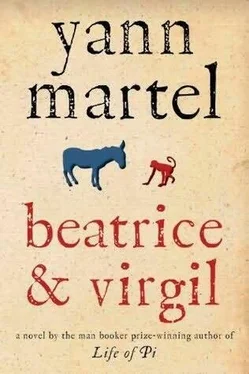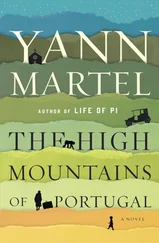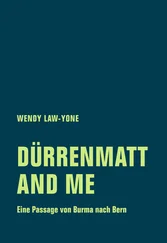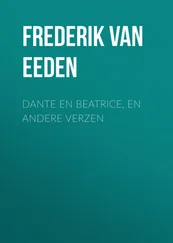Yann Martel - Beatrice and Virgil
Здесь есть возможность читать онлайн «Yann Martel - Beatrice and Virgil» весь текст электронной книги совершенно бесплатно (целиком полную версию без сокращений). В некоторых случаях можно слушать аудио, скачать через торрент в формате fb2 и присутствует краткое содержание. Жанр: Современная проза, на английском языке. Описание произведения, (предисловие) а так же отзывы посетителей доступны на портале библиотеки ЛибКат.
- Название:Beatrice and Virgil
- Автор:
- Жанр:
- Год:неизвестен
- ISBN:нет данных
- Рейтинг книги:5 / 5. Голосов: 1
-
Избранное:Добавить в избранное
- Отзывы:
-
Ваша оценка:
- 100
- 1
- 2
- 3
- 4
- 5
Beatrice and Virgil: краткое содержание, описание и аннотация
Предлагаем к чтению аннотацию, описание, краткое содержание или предисловие (зависит от того, что написал сам автор книги «Beatrice and Virgil»). Если вы не нашли необходимую информацию о книге — напишите в комментариях, мы постараемся отыскать её.
A famous author receives a mysterious letter from a man who is a struggling writer but also turns out to be a taxidermist, an eccentric and fascinating character who does not kill animals but preserves them as they lived, with skill and dedication – among them a howler monkey named Virgil and a donkey named Beatrice…
Beatrice and Virgil — читать онлайн бесплатно полную книгу (весь текст) целиком
Ниже представлен текст книги, разбитый по страницам. Система сохранения места последней прочитанной страницы, позволяет с удобством читать онлайн бесплатно книгу «Beatrice and Virgil», без необходимости каждый раз заново искать на чём Вы остановились. Поставьте закладку, и сможете в любой момент перейти на страницу, на которой закончили чтение.
Интервал:
Закладка:
"Yes, I was. It's striking."
"It's the skull of a howler monkey."
"It is?" Henry felt a quiver of horror.
"Yes."
"But not Virgil's?"
"No. Virgil's skull is inside Virgil's head."
Thirty minutes later Henry walked out of the store, an impatient Erasmus pulling at his leash. It was good to be out in the brisk air again. Henry was late for rehearsal but he entered the small grocery store anyway. He asked if he could have a dish of water for Erasmus. The man behind the counter kindly obliged.
"That's quite the store around the corner," Henry said to him.
"Yeah. It's been there since the dinosaurs went home."
"What's he like, the man who runs it?"
"Crazy old man. Gets into fights with the whole neighbourhood. Comes in here to do two things and only two things: to buy pears and bananas and to make photocopies."
"I guess he likes pears and bananas and he doesn't have a photocopier."
"I guess so. I'm amazed his business survives. Is there really a market for stuffed aardvarks?"
Henry didn't mention the expensive monkey's skull that was in the bag he had gingerly placed on the floor. Skull and glass dome had been packed so that they would arrive safe and sound at their destination. There was also the wolf, the still one, not the leaping one, that had interested Henry, but he had managed to check his impulse.
The man looked at what he had placed on the counter.
"Now there's a vintage piece of technology. Haven't seen a cassette player like that since I was a kid," he said.
"Old and reliable," Henry replied, picking up his precious cargo and heading for the door. "Thank you for the water."
In the taxi home, Erasmus collapsed on the floor and fell asleep right away. Henry thought about the taxidermist. He was not conventionally attractive, fell on the unhandsome side of ordinary, with an inexpressive face that did not project what it was thinking or feeling. Yet those dark staring eyes! His presence had a suffocating quality, but at the same time he radiated a certain magnetism. Or did that appeal come from all the glass-eyed animals surrounding him? Strange that someone so involved with animals should react so little-in fact, not at all-to a live one right in front of him. The taxidermist hadn't even glanced at Erasmus.
Henry thought of him again as a man with a mask. But he'd given the taxidermist a task, to write something about his trade. That should start to make him less of a sphinx. Henry reflected on his day. He had started it meaning only to drop off a card, and now he was loaded down with goods from Okapi Taxidermy and committed to returning.
As soon as he got home, he told Sarah.
"I met the most amazing man," he told her. "This old taxidermist. A shop like you wouldn't believe. All of creation stuffed into one large room. His name's Henry, as it happens. An odd fish. I couldn't place him at all. He's written a play and he wants my help."
"What kind of help?" she asked.
"Help writing it, I think."
"What's it about?"
"I'm not sure. There are two characters, a monkey and a donkey. They're quite focussed on food."
"Is it for children?"
"I don't think so. In fact, it reminded me of…" but Henry let his voice trail off. He didn't want to mention what the play reminded him of. "The monkey isn't popular," he said instead.
Sarah nodded her head. "So you've been roped into becoming a collaborator without even knowing what the story's about?"
"I guess so."
"Well, you seem excited. That's nice to see," said Sarah.
She was right. Henry's mind was racing.
The next day Henry went to the main public library to do research on howler monkeys. He discovered odds and ends about the species, that they live in matrilineal groups, for example, and that they keep no fixed territory but over time roam the forest, searching for food and avoiding threats. That evening, after locking Erasmus in the farthest room, he set the cassette player next to the computer and listened to the howl again. He tried to describe it from Beatrice's perspective. If he remembered correctly, she was talking to an imaginary person while she was waiting for Virgil to come back from foraging for food:

A howl, a roar, a howling roar, a deafening roar-these barely hint at the reality. To compare it to other animals' cries becomes a kind of zoological one-upmanship that addresses only the aspect of volume. A howler monkey's roar exceeds in volume the cry of a peafowl, of a jaguar, of a lion, of a gorilla, of an elephant-at which point the inflating of hulk stops, at least on land. In the ocean, the blue whale, which can weigh well over one hundred and fifty tons, the largest animal ever to grace this planet, can put out a cry at a volume of one hundred and eighty decibels, which is louder than a jet engine, but this cry is at a very low frequency, hardly audible to a donkey, which is probably why we call the whale's cry a song . But we must, in all fairness, grant the blue whale top spot. So there, if they were lined up side by side, between the massive bull elephant and the colossal blue whale, involving a serious dropping of the eyes, stands Virgil and his kind, without a doubt the most noise per kilo of any life-form on earth.
One could endlessly dither about the carrying power of a howler's howl. Two miles, three miles, heard over hills, heard against contrary winds-various observers have given their estimates. But the nature of Virgil's howl, its aural quality, goes missing in all these measures. I have, on occasion, heard sounds that reminded me of it. Once Virgil and I were walking by a hog farm while a herd was being roughly moved out of an enclosure. Panic set in among the animals and they started up, and that sound, of an entire herd of swine barking and squealing in distress, collectively, brought to my mind something of Virgil's howl.
Another time we encountered a heavily loaded wagon whose axles had not been greased in a long while. Every so often the undercarriage let out a pent-up, bone-crunching squeak, dry and thunderous, which, had it been magnified a hundredfold, would also have conveyed some of the life and power of Virgil's cry.
And I read once a description in Apuleius, my favourite classical writer, of an earthquake that made "a hollow, bellowing noise" and this image, of the earth itself in crisis, moaning and groaning, also clothes well enough in words Virgil's holler.
But ultimately there is only the thing itself, in its raw purity. Hearing is believing.
Henry returned to see the taxidermist within a few days. He was nervous about holding on to his obsolete cassette player and the precious tape, but he was also eager to share with him what he had written.
Henry brought Erasmus again, but this time he tied him outside. The taxidermist seemed neither pleased nor displeased to see him. Henry was confused. He had phoned the taxidermist to tell him he would be coming. They had agreed on a time. Henry wondered if he had made a mistake and if he was late or early. But it just seemed to be the taxidermist's manner, the way he was. He was wearing an apron and was moving a wild boar into the workshop when Henry entered the store.
"Need help?" Henry asked.
The taxidermist shook his head without saying a word. Henry stood and waited, marvelling at the animals. He was happy to be back. This was a room full of adjectives, like a Victorian novel.
"Come in," said the taxidermist from the back room. Henry turned in to it. The taxidermist was already sitting at his desk. Henry sat on the stool again, like an obedient junior clerk. He handed the taxidermist the part he had written for Beatrice. While the other man read, which he did slowly, Henry looked around. The taxidermist had finished the deer he was working on when Henry had first visited. But the other mannequin, the round one, was no further advanced. As for Virgil and Beatrice, they were still in conversation.
Читать дальшеИнтервал:
Закладка:
Похожие книги на «Beatrice and Virgil»
Представляем Вашему вниманию похожие книги на «Beatrice and Virgil» списком для выбора. Мы отобрали схожую по названию и смыслу литературу в надежде предоставить читателям больше вариантов отыскать новые, интересные, ещё непрочитанные произведения.
Обсуждение, отзывы о книге «Beatrice and Virgil» и просто собственные мнения читателей. Оставьте ваши комментарии, напишите, что Вы думаете о произведении, его смысле или главных героях. Укажите что конкретно понравилось, а что нет, и почему Вы так считаете.












